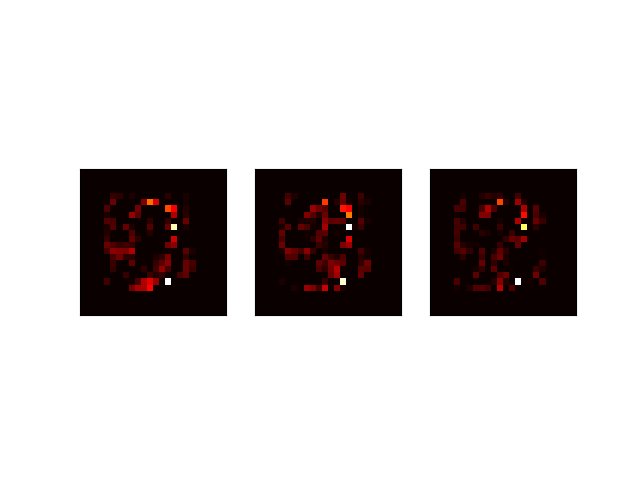Note
Click here to download the full example code
MTW Handwritten Digits Classification¶
This example performs classification of Handwritten digits using MTW. Each digit recognition is learned as a sparse regression task. This example can be used to reproduce the results of (Janati et al., Aistats’19).
import numpy as np
import os
from download import download
from mtw import MTW, utils
from matplotlib import pyplot as plt
print(__doc__)
seed = 42
rnd = np.random.RandomState(seed)
# set n_samples
n_samples = 30
n_features = 240
# take only 3 tasks to run example fast
tasks = [0, 1, 2, 4, 5, 6]
tasks = [0, 1, 2]
n_tasks = len(tasks)
mtgl_only = False
positive = False
Out:
Download data. The images ‘X’ are grouped and sorted. Generate true labels ‘Y’ accordingly
if not os.path.exists('./data'):
os.mkdir('./data')
url = "http://archive.ics.uci.edu/ml/machine-learning-databases/"
url += "mfeat/mfeat-pix"
path = download(url, ".data/digits.txt", replace=True)
Xraw = np.loadtxt(".data/digits.txt")
Xraw = Xraw.reshape(10, 200, 240)
yraw = np.zeros((10, 2000))
for k in range(10):
yraw[k, 200 * k: 200 * (k + 1)] = 1.
yraw = yraw.reshape(10, 10, 200)
Out:
Downloading data from http://archive.ics.uci.edu/ml/machine-learning-databases/mfeat/mfeat-pix (1.4 MB)
file_sizes: 0%| | 0.00/1.44M [00:00<?, ?B/s]
file_sizes: 5%|#3 | 73.7k/1.44M [00:00<00:02, 660kB/s]
file_sizes: 23%|######5 | 336k/1.44M [00:00<00:01, 792kB/s]
file_sizes: 100%|##########################| 1.44M/1.44M [00:00<00:00, 1.09MB/s]
Successfully downloaded file to .data/digits.txt
Each digit corresponds to a task. Reshape data to fit a multi-task learner and split it into a cv and validation set. Here the design matrix X is the same for all tasks.”””
samples = np.arange(200)
samples = rnd.permutation(samples)[:n_samples]
mask_valid = np.ones(200).astype(bool)
mask_valid[samples] = False
ycv = yraw[tasks][:, tasks][:, :, samples].reshape(n_tasks, -1)
yvalid = yraw[tasks][:, tasks][:, :, mask_valid].reshape(n_tasks, -1)
yvalid = np.argmax(yvalid, axis=0)
Xvalid = Xraw[tasks][:, mask_valid].reshape(-1, n_features)
X = Xraw[tasks][:, samples]
X = X.reshape(n_tasks * n_samples, n_features)
scaling = X.std(axis=0)
scaling[scaling == 0] = 1
X = X / scaling
Xcv = np.array(n_tasks * [X])
Compute a Euclidean Ground metric M on a 2D grid.
x = np.arange(16).reshape(-1, 1).astype(float)
y = np.arange(15).reshape(-1, 1).astype(float)
xx, yy = np.meshgrid(x, y)
M1 = abs(xx - yy) ** 2
M = M1[:, np.newaxis, :, np.newaxis] + M1[np.newaxis, :, np.newaxis, :]
M = M.reshape(n_features, n_features) ** 0.5
M_ = M ** 2
M_ /= np.median(M_)
Create an MTW instance and fit
epsilon = 10. / n_features
betamax = np.array([x.T.dot(y) for x, y in zip(Xcv, ycv)]).max() / n_samples
alpha = 50. / n_samples
beta = 0.075 * betamax
gamma = utils.compute_gamma(0.8, M)
mtw = MTW(M=M_, alpha=alpha, beta=beta, epsilon=epsilon, gamma=gamma,
positive=positive, stable=False, tol_ot=1e-5, maxiter_ot=15,
tol=1e-4, tol_cd=1e-4, maxiter=1000)
mtw.fit(Xcv, ycv)
coefs_ = mtw.coefs_.copy()
ypred = np.argmax(Xvalid.dot(coefs_), axis=1)
errors = (ypred != yvalid).reshape(n_tasks, -1).mean(axis=1)
print(f"Classification error for predicting digits {tasks}:")
print(errors)
Out:
******** WARNING: Stopped early in main loop. *****
You may want to increase mtw.maxiter.
Time ot 25.1 | Time cd 19.3
Classification error for predicting digits [0, 1, 2]:
[0.01176471 0.02352941 0.01176471]
Imshow coefficients
largecoef = np.zeros((n_tasks, 24, 24))
coefs_ = mtw.coefs_.copy()
coefs_ /= coefs_.max(axis=0)[None, :]
coefs_ = np.clip(coefs_, 0, None)
c = coefs_.reshape(16, 15, n_tasks)
c = np.swapaxes(c, 0, 2)
largecoef[:, 4:19][:, :, 4:20] = c
f, axes = plt.subplots(1, n_tasks)
for ax, coef in zip(axes.T, largecoef):
ax.imshow(np.log(coef.T + 0.1), cmap="hot")
ax.set_xticks([])
ax.set_yticks([])
plt.show()

Total running time of the script: ( 0 minutes 45.733 seconds)